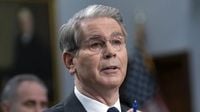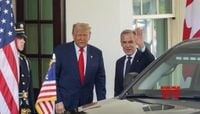SEOUL – Acting President and Education Minister Lee Ju-ho stated on May 7, 2025, that South Korea will engage in calm and coordinated negotiations with the United States regarding tariffs, amid shifting US trade policies that he described as part of a "grave situation." Speaking at a high-level economic security strategy meeting in Seoul, Lee emphasized the government's commitment to push forward discussions with Washington under the leadership of the minister of trade, industry and energy.
Lee highlighted the importance of close coordination among all relevant ministries, stating, "The government will work closely across ministries under the responsibility of the minister in charge of trade policy to proceed with discussions with the US in an orderly manner." This meeting was convened to assess the current state of Korea-US tariff talks and the government's overall response system.
"Recent tariff actions driven by changes in US trade policy have created a serious and ongoing situation," Lee noted, underlining the urgency of the negotiations. The South Korean government has already established a consultation framework through the so-called "2+2 trade dialogue" with the US, aimed at formulating a "July Package" by July 8, 2025, when the current mutual tariff suspension period expires.
This package is expected to outline shared priorities through technical consultations with the US, setting the groundwork for the next Korean administration's negotiations. Lee confirmed that ministerial-level talks with US counterparts are scheduled to take place during the Asia-Pacific Economic Cooperation (APEC) trade ministers' meeting in mid-May.
In addition, US Trade Representative Jamieson Greer is slated to visit South Korea next week as part of the APEC meetings, signaling ongoing ministerial-level engagement between the two nations. Lee reaffirmed the government's commitment to minimizing public anxiety and potential damage to Korean industries from a volatile trade environment, pledging to protect the country's economic interests.
Meanwhile, Lee also addressed a separate issue involving a delayed nuclear power contract with the Czech Republic. The signing, which had been scheduled for Tuesday, was postponed after French utility company EDF won a court injunction. "The Czech government has stated that the bidding process has been transparent and lawful," Lee said. "We will work closely with Czech authorities to resolve legal issues and reach a final agreement as swiftly as possible."
In related news, the European Union is preparing to propose tariffs on Boeing Co. aircraft and US-made cars if trade talks with President Donald Trump's administration fail to de-escalate a brewing trade conflict. This move underscores the rising tensions in global trade relations and the potential for further disruptions in international markets.
As the US and China prepare for high-stakes trade talks in Switzerland, officials from both nations aim to ease trade tensions amid escalating tariffs. The meeting, which is set for May 8, 2025, marks the most significant engagement since Trump's trade war began. US Treasury Secretary Scott Bessent and Trade Representative Jamieson Greer will represent the US, while Chinese Vice Premier He Lifeng will lead the discussions for China.
These talks come on the heels of the Trump administration imposing 145 percent tariffs on Chinese goods last month, which prompted a swift retaliation from Beijing with 125 percent tariffs on American imports. Although China has recently exempted certain US products, including pharmaceuticals and microchips, tensions remain high, with American firms scaling back orders and delaying investments due to economic uncertainty.
Bessent stated, "Current tariffs are the equivalent of an embargo," emphasizing that the meeting is not just about bilateral ties but part of a broader effort to restore balance in the global economic system. Lin Jian, spokesperson for China's Ministry of Foreign Affairs, confirmed the meeting and noted that Beijing would not compromise on core principles.
In another development, Canadian Prime Minister Mark Carney reported on May 7, 2025, that he had constructive discussions with US President Donald Trump at the White House, though they disagreed on tariffs and the notion of Canada becoming the "51st state." Carney stated that he and Trump agreed to continue conversations in the coming weeks and meet again in person at the G7 summit in Kananaskis, Alberta.
During the meeting, Carney expressed that it was "not useful" to repeat the 51st state idea, while Trump made it clear that tariffs, especially those on the auto sector, would remain in place. Trump also commented on the US-Mexico-Canada Agreement (USMCA), calling it a "transitional step" that "terminates fairly shortly," without committing to its renewal.
In response to the ongoing trade tensions, Canada has implemented its own tariffs on non-USMCA compliant vehicles and additional fees on various goods. With the new tariffs in place, Canada's trade with the US fell in March 2025, according to Statistics Canada.
As the global trade landscape continues to shift, markets are closely monitoring the outcomes of these negotiations. European shares climbed on May 8, 2025, after Trump signaled progress toward a major trade deal, boosting market sentiment. The pan-European STOXX 600 index rose by 0.3% as traders reacted positively to the news.
Trump hinted at a forthcoming news conference regarding a "major trade deal with representatives of a big, and highly respected, country," with speculation that the deal could involve Britain. This potential breakthrough comes ahead of anticipated ice-breaker talks between Washington and Beijing trade officials this weekend, raising hopes for de-escalation in trade tensions between the world's two leading economies.
As the Federal Reserve held its interest rates steady, the markets are also keenly watching the Bank of England's policy meeting, with expectations for a quarter-point rate cut. Amidst these developments, shares of A.P. Moller-Maersk fell 2.1% after the shipping group lowered its global container market forecast due to increased economic and geopolitical uncertainty.
In conclusion, as global trade relations remain precarious, the outcomes of these negotiations will be pivotal in shaping economic ties and market stability across nations. The ongoing discussions reflect the complexities of international trade and the necessity for collaborative approaches to navigate these turbulent waters.





